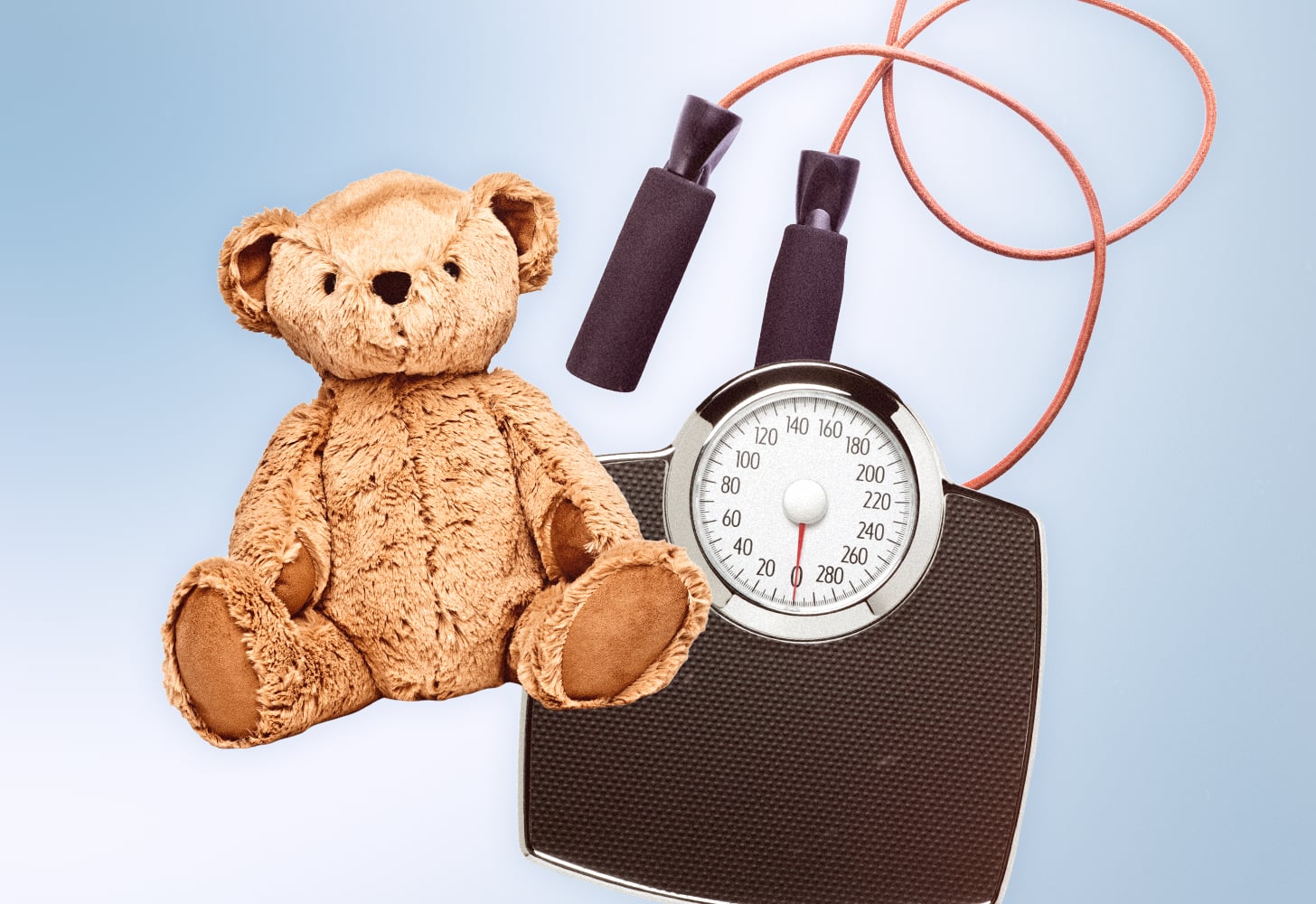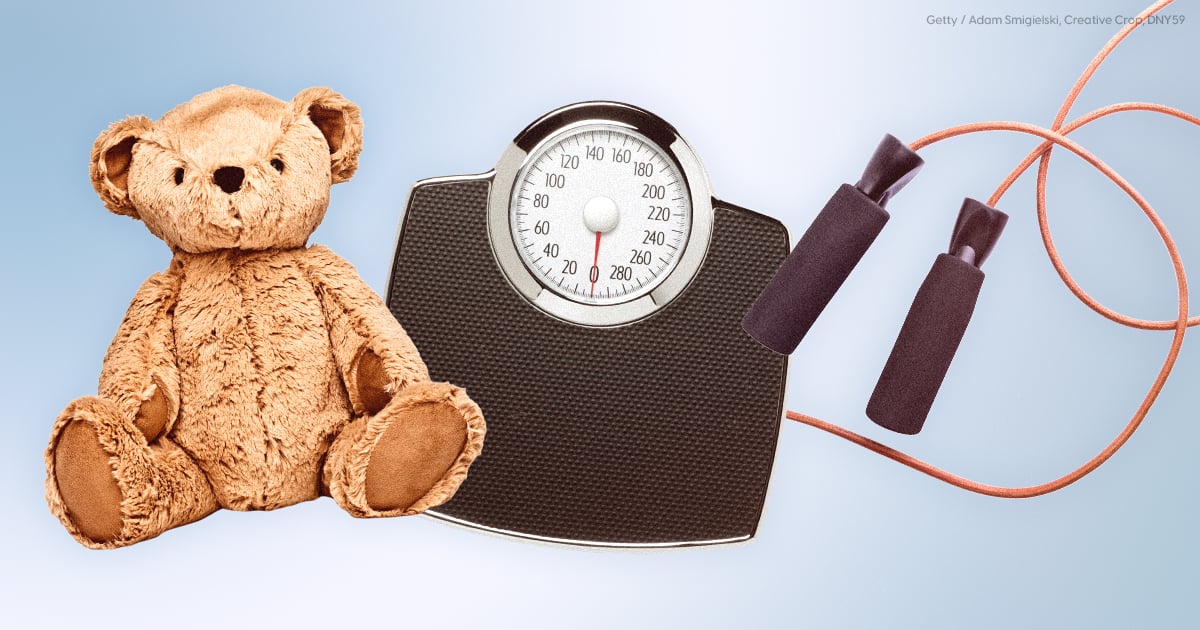
Conversations around weight are tricky enough to tackle and process as an adult. But guidelines out of the U.S. Preventive Services Task Force (USPSTF) are encouraging that children as young as age 6 get looped into the discussion.
More specifically, the panel is building upon previous recommendations given in 2017, which stated that starting at age 6 kids should be screened for “obesity,” defined as an age- and sex-specific body mass index in the 95th percentile or greater, based on year 2000 Centers for Disease Control and Prevention [CDC] growth charts.
The most recent USPSTF recommendation suggests that kids flagged for “obesity” should receive at least 26 hours of intensive counseling. The counseling would be carried out with one or more health professionals (including pediatricians, exercise physiologists or physical therapists, dieticians or diet assistants, psychologists or social workers, or other behavioral specialists) to focus on physical activity and behavioral interventions. Many of the sessions would target both the parent and child, to provide information about healthy eating, safe exercising, reading food labels, while also promoting problem solving, monitoring diet and activity behaviors, and goal setting, per the task force statement.
The USPSTF is backed by the Agency for Healthcare Research and Quality and housed under the Department of Health and Human Services. It comprises of a volunteer panel of experts in prevention and evidence-based medicine that provide their recommendations on preventative services, like screenings, preventative medications, and counseling services.
Increased weights among US children has been a growing concern among health authorities over the past decade. According to a report from the Centers for Disease Control and Prevention, childhood obesity in the United States affects 14.7 million children and teens, and experts are looking at ways to curb the rise.
However, these new draft recommendations, which are still open for public comment, have worried dietitians who work closely with children and teens. And parents, like myself, have their own set of questions. All of it raises the question whether these guidelines are really the best solution for America’s youth? And how will it effect our children in the long run?
What Experts Really Think About the New Draft Recommendations
While some within the medical community think the new draft guidelines could be a useful step for curbing what they see as a harmful trend of increased weights among children, many experts — specifically those within the anti-diet and fat-acceptance movements — are alarmed by the recommendations.
For starters, the guidelines proposed by USPSTF focus on body size and not health, says Diana Rice, RD, owner of Tiny Seed Family Nutrition and the voice behind the online platform @anti.diet.kids.
“The interventions are based on research that indicates that large body size is a predictor of health concerns down the line, but what this type of research always fails to explore is the factors such as weight stigma, yo-yo dieting, poverty, and systemic oppression that have a much stronger influence on a child’s long-term health outcomes,” she tells POPSUGAR.
Other anti-diet dietitians express concerns about the long-term effects of the counseling.
“Hopefully, 6-year-olds are not thinking about their weight at all, and introducing these concepts along with restrictive eating practices puts the child at risk for a lifelong compromised relationship with food,” says Jessica Jaeger, MS, RD, a registered dietitian who specializes in eating disorders and intuitive eating.
“Beginning intensive weight loss counseling at 6 years old feels alarmist and rooted in weight stigma,” Jaeger adds, noting that this type of intervention for a child as young as 6 years feels developmentally inappropriate. “The primary nutrition goal for any child is growth, and focusing on weight loss may undermine this goal,” Jaegar says.
Her concerns are echoed by Dani Lebovitz, MS, RDN, author of “STEAM-Powered Food Adventures,” a children’s activity book designed to promote food exploration. “As a pediatric registered dietitian, I practice from the perspective that there is never a one-size-fits-all approach to nutrition and well-being, but my number-one priority is nurturing a positive relationship with food and bodies,” Lebovitz tells POPSUGAR.
“The USPSTF’s recommendation for intensive counseling from age 6 risks perpetuating a diet-culture narrative, equating thinness with ideal health and moral worth,” she explains. This approach overlooks the fact that certain health determinants are beyond individual control, including social and environmental factors, she adds.
So, What Should Parents Do?
Both Lebovitz and Jaeger agree that parents need to be very cautious before discussing weight with their children. In fact, both experts suggest nixing the topic of weight altogether.
Instead, along with modeling balanced eating, parents can have conversations that remain body-neutral. “I encourage parents to talk about body diversity; that bodies come in all shapes and sizes, no matter their child’s shape or size, and celebrate ‘how cool’ it is that everyone is different,” Lebovitz says. “These conversations help neutralize all bodies as just bodies, minimizing stigma and shame from both a self-esteem and peer-to-peer viewpoint.”
If your child initiates a conversation about their body or brings up questions or concerns about their body, there are a few important steps to follow, says Zoë Bisbing, LCSW, an eating disorders psychotherapist and creator of Body-Positive Home, an online hub offering workshops and resources around one’s relationship with their body and food. Bisbing suggests the following:
- Thank your child for bringing the question or concern to you.
- Inquire gently about what makes them ask the questions they have.
- Answer them honestly and be clear about your values with respect to bodies and health.
“If a larger child wants to talk about their body size, it’s reasonable to ask them how it feels to live inside the body you have,” Bisbing says. But again, talk about it through the lens of body diversity. “Talk to them about how very different health and weight is and that health can be pursued at any size,” Bisbing says.
Navigating doctor appointments with your child where conversations about their weight may come up needs to be handled intentionally, too. Especially if you have a child in a larger body, it may be best to contact the office prior to the appointment to request the doctor holds all conversation about your child’s weight, shape, size, until your child is not present, Bisbing advises. “Weight-focused conversations about children are incredibly risky. We want to protect children from the belief that their body is wrong or a problem to be fixed,” she explains.
Lebovitz agrees with contacting your child’s pediatrician ahead of time and suggests reminding the office the day of an appointment as well. “For the day of the appointment, prepare a sticky note to hand to the nurse while bringing your child back that also expresses these preferences,” she shares. “If your pediatrician’s office does not align with your family’s core values, I recommend finding a provider that works from a more balanced approach to care, prioritizing physical, mental, and emotional health.”
As parents, it’s important to remember that “kids’ bodies may naturally be on the higher end of the weight spectrum, and that is not necessarily a problem to be fixed,” Jaeger explains. Instead, “parents can collaborate with pediatricians to determine if children are trending appropriately on their growth charts, and of course, by attending yearly physicals to evaluate overall health status” and continue to model healthy eating and a positive relationship with food through family meals, getting everyone involved in food preparation, and eating in a healthful way.
